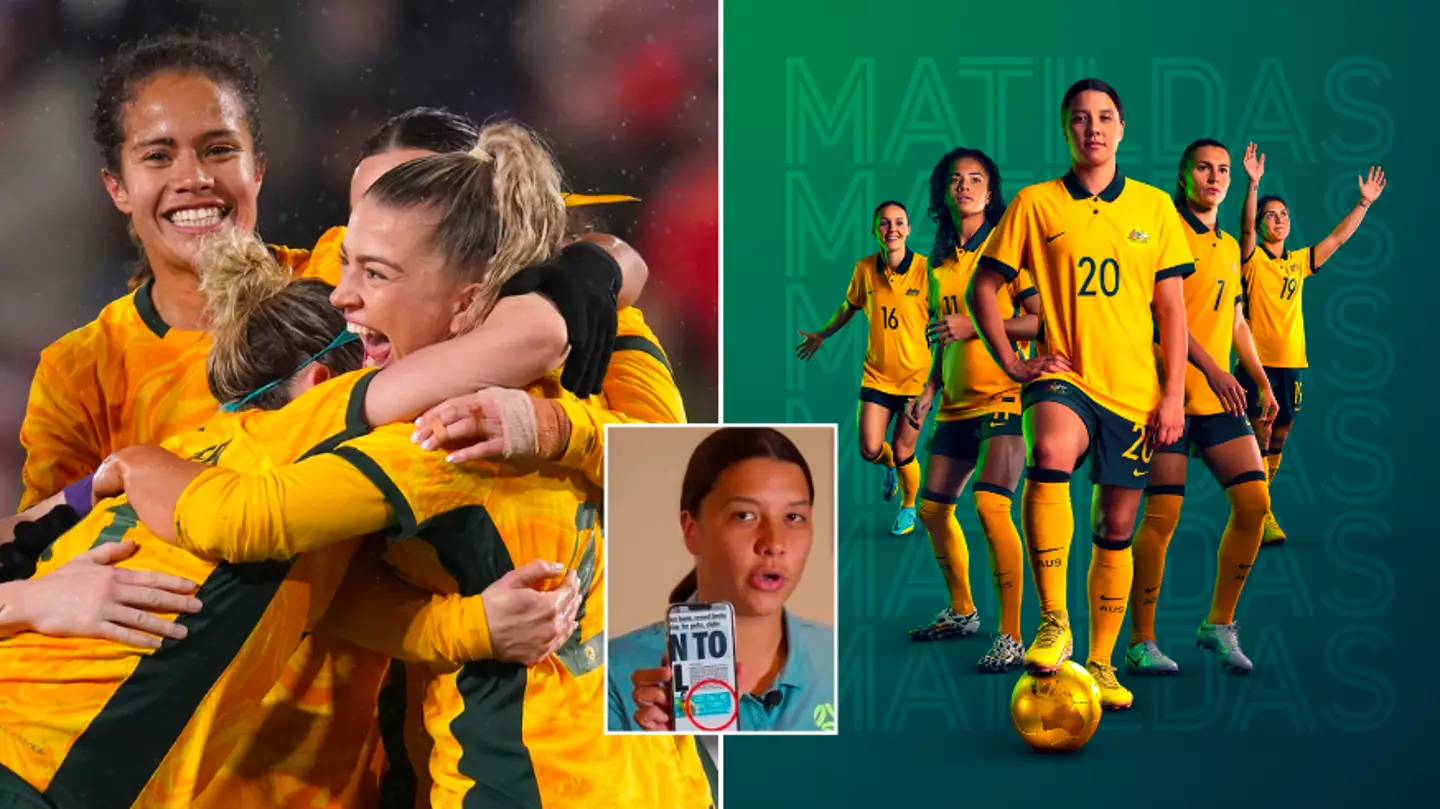

The countdown to the 2023 Women’s World Cup is officially on.
In less than one month, Australia and New Zealand will play host to one of the biggest sporting tournaments on the planet.
Thousands of fans are expected to head Down Under to witness it in the flesh, while millions will tune in from the comfort of their living room sofas.
Advert
But this event goes far beyond 22 players kicking a ball on a field.
For women, the youth generation and the entire nation of Australia, it will have a lasting impact which will see people talking about it for years to come.
The sheer importance of the tournament and what it means to the players is on show in the documentary ‘The Matildas: World at Our Feet’ which is on Disney+.
The fly-on-the-wall series follows the stories of the Matildas delving into the lives of our favourite players including global superstar Sam Kerr, Ellie Carpenter, Mary Fowler and more.
Advert
It gives fans a behind-the-scenes look at the sacrifices they’ve made and struggles they’ve endured as they work towards their biggest challenge yet and strive to become the best in the world’s most popular sport in front of their home crowd.
There’s some important cultural moments littered throughout the entire series, here's a snippet of them!
Impact of the sport on younger generations
Advert
After a truly-spine tingling intro, episode one of the docuseries delves into the impact of sport on the youth generation.
"You can't be what you can't see."
These words from Kyah Simon in the doco carry so much weight when you truly look at the rise of women's sport around the globe.
For many women, they weren't given the opportunity to have a female role model during their childhood, simply because big-name women's sports stars weren't as common.
Advert
Now, though, things have changed.
Enter: the Matildas.
Advert
"When I grew up, I didn't even know who the Matildas were – it just wasn't on TV," Aussie defender Steph Catley says in the opening sequence.
"All of my role models were men. If anyone asked me who my female sporting idol growing up was, I can't answer it because I didn't have it.
"That's the main thing now, is inspiring the next generation and showing girls that they can do whatever they want to do."
The emergence of high-profile female athletes, particularly footballers, has seen the likes of Sam Kerr and Ellie Carpenter become household names – not just among young girls, but boys too.
Yet perhaps most importantly, the rapid growth in women's football has played a major role in driving participation at grassroots levels, providing career opportunities and - of course - creating more female role models for the younger generation.
Equality issues overcome by the team
Throughout the docuseries, we see the Matildas constantly battle with issues of equality.
Despite the rise of women’s football in recent years, the sport is still forced to deal with sexism and misogyny on a daily basis.
And that, unfortunately, was on show in the doco when Matildas captain Sam Kerr came under fire from former Socceroo Robbie Slater.
In an article published in the Daily Telegraph, Slater claimed that Kerr’s goals record for Australia was ‘not equal’ to Tim Cahill’s own tally for the men’s national team.
Kerr, who was visibly fuming, reacted to the headline in the series – handling it with professionalism and grace.
“Did you guys see Robbie Slater’s article?” Kerr says during a team media day.
“Like, literally the most sexist thing you could say. It literally says ‘Kerr’s goals are not equal’.
“Imagine little girls reading that. I cannot believe, in this day and age, that someone could write this and have young girls read it. And that the Telegraph would actually publish such a sexist comment on the front page.
“It’s not about me, it’s about a young girl growing up being like ‘oh, no matter what I do, like’ anyway.”
The scene serves as a strong reminder that female athletes, all the way from grassroots levels to elite professionals, are still dealing with issues of equality.
Unfortunately, even Sam Kerr who is arguably Australia’s greatest ever footballer - male or female - finds herself in the firing line for no apparent reason.
Hopefully, with the World Cup coming to Australian shores, it can be a catalyst for change.
Cathy Freeman inspiration
One person who holds a special place in the hearts of all Aussies, particularly our Matildas, is a woman by the name of Cathy Freeman.
During the Sydney Olympics Games in 2000, Indigenous woman Freeman captured the imaginations of the nation when she powered home to capture gold in the women’s 400 metres final in front of a roaring home crowd.
At the time, it was a special moment.
And 23 years on, it still has an impact on men and women throughout the world – our favourite Matildas players included.
In the final episode of the docuseries, goalkeeper Lydia Williams - who is First Nations herself - can be seen sitting in the Australian outback watching the sun go down.
She then cites Freeman’s heroics as one of her inspirations, saying: “it ignited my dreams”.
But Williams isn’t alone with many other Matildas stars also crediting Freeman as their hero – Kerr being one of them too.
“At the time, I was amazed and blown away that every single person in the country could be talking about one person and she was a female athlete,” Kerr says.
Kyah Simon, who is also Indigenous, added: “As I sat in my lounge room as a nine year old girl and watched her, that inspired me to be proud of who I am and also follow my sporting dreams to play football for Australia.
“I got inspired by an Indigenous woman running. I hope that I can inspire someone else.”
The opening sequence of the final episode is truly spine-tingling and serves as a reminder of the magnitude of the Women’s World Cup in creating female icons who will inevitably carve their names into sport’s history books.
Featured Image Credit: Supplied/AlamyTopics: Australia, Documentaries, Football, Womens World Cup, Womens Football